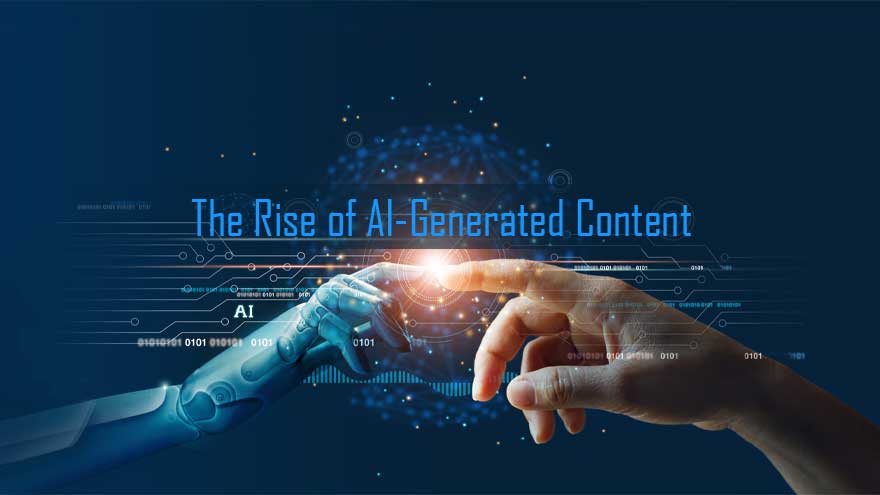AI-generated content is transforming industries like journalism, marketing, and education by automating content creation and enhancing personalization. Explore the benefits, ethical considerations, and future trends of this revolutionary technology in our in-depth article.

In recent years, artificial intelligence (AI) has made significant strides in various domains, but one of the most intriguing and rapidly evolving applications is AI-generated content. This technology, which involves the use of sophisticated algorithms and machine learning models to produce text, images, and even videos, is transforming the way we create, consume, and interact with digital media. As we navigate through 2024, AI-generated content is not just a buzzword; it's a powerful tool reshaping industries and redefining creativity.
AI-generated content has its roots in natural language processing (NLP) and machine learning. Early models, such as the Markov chains and simple recurrent neural networks, paved the way for more advanced systems. However, it was the advent of transformer models, particularly OpenAI's Generative Pre-trained Transformer (GPT) series, that revolutionized the field. The latest iteration, GPT-4, boasts an impressive capability to generate coherent and contextually relevant text, rivaling human writers in many respects.
The versatility of AI-generated content is evident in its widespread applications across various sectors:
News agencies and content creators are increasingly leveraging AI to draft articles, reports, and blog posts. AI can quickly analyze vast amounts of data, identify trends, and generate insightful content. For instance, The Washington Post's AI, Heliograf, has been used to cover sports events and elections, providing timely and accurate reports.
AI-generated content is a game-changer for marketing and advertising. Personalized ad copy, email campaigns, and social media posts can be created at scale, tailored to individual preferences and behaviors. This level of customization enhances engagement and conversion rates, making marketing efforts more efficient and effective.
The entertainment industry is also embracing AI-generated content. AI algorithms can generate scripts, compose music, and even create visual art. For example, the AI-generated painting "Edmond de Belamy" sold for $432,500 at auction, highlighting the growing acceptance of AI in the art world.
In education, AI-generated content can create personalized learning materials, quizzes, and tutorials. This technology ensures that educational content is accessible and engaging, catering to different learning styles and paces. AI can also generate summaries and explanations, aiding students in understanding complex subjects.
Despite its potential, AI-generated content raises several ethical and practical concerns:
Ensuring the accuracy and quality of AI-generated content is paramount. While AI can produce coherent text, it may still generate errors or propagate misinformation. Rigorous validation and human oversight are necessary to maintain credibility.
The use of AI in content creation poses questions about intellectual property rights. Who owns the content generated by AI? This legal grey area requires clear regulations to protect creators and ensure fair use.
AI models are trained on vast datasets, which may contain biases. These biases can be inadvertently reflected in the generated content, perpetuating stereotypes and discrimination. Developers must work towards creating more inclusive and fair AI systems.
The rise of AI-generated content has sparked fears of job displacement among writers, journalists, and creatives. While AI can automate routine tasks, it also opens up new opportunities for human-AI collaboration, where humans focus on higher-level creative and strategic tasks.
The future of AI-generated content is both exciting and uncertain. As AI technology continues to evolve, we can expect more sophisticated and versatile content generation capabilities. Here are a few potential developments:
AI will enable even greater levels of personalization in content creation. By analyzing user data and preferences, AI can generate highly customized content that resonates with individual users, enhancing engagement and satisfaction.
Real-time content generation will become more prevalent, allowing for instant creation and dissemination of news, marketing materials, and other content types. This will be particularly useful in fast-paced industries where timely information is crucial.
AI-driven collaboration tools will facilitate seamless teamwork between humans and AI. These tools will allow for more efficient content creation processes, where AI handles routine tasks, and humans focus on creativity and strategy.
AI will unlock new creative possibilities, enabling the creation of content that was previously unimaginable. From interactive storytelling to dynamic, adaptive content experiences, the boundaries of creativity will expand.
AI-generated content is undeniably transforming the digital landscape. Its applications are vast, spanning multiple industries and offering unprecedented opportunities for innovation and efficiency. However, it also brings forth significant challenges that need to be addressed to ensure ethical and responsible use. As we move forward, the key will be to strike a balance between leveraging AI's capabilities and maintaining human oversight and creativity. The rise of AI-generated content is not the end of human creativity but rather a new chapter in the ever-evolving story of technological advancement.